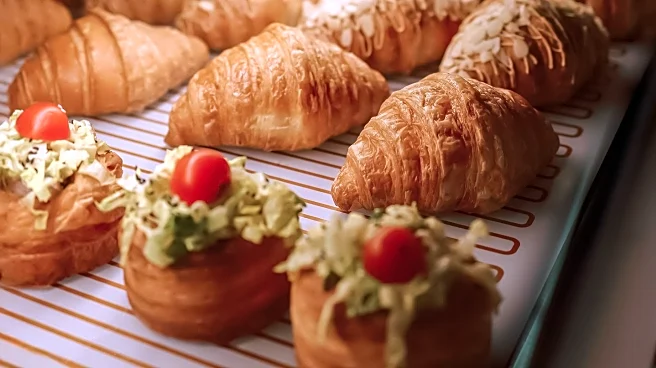What's Happening?
On Sunday, approximately 100 runners participated in a unique half-marathon event in New York City called the 'Bakery Run.' The race, which began in Bushwick, Brooklyn, and traversed through Manhattan and back into Brooklyn Heights, featured stops at nearly a dozen local bakeries. Participants indulged in various pastries, including cream-filled croissants and savory-stuffed hand pies, as they completed the 13.1-mile course. The event was organized by TIPSTER, a media company, and was designed to celebrate the city's vibrant baking culture alongside the popular activity of running. The race was divided into three waves to accommodate different experience levels: advanced, intermediate, and beginner runners.
Why It's Important?
The 'Bakery Run' highlights a growing trend of combining fitness with culinary experiences, appealing to both health enthusiasts and food lovers. This event not only promotes physical activity but also supports local businesses by drawing attention to the city's bakeries. Such events can boost the local economy by increasing foot traffic and sales for participating bakeries. Additionally, it reflects a broader cultural shift towards experiential activities that blend lifestyle interests, potentially influencing future event planning and community engagement strategies.
What's Next?
Following the success of the NYC 'Bakery Run,' similar events are planned for other major cities worldwide, including London, Mexico City, and Amsterdam. This expansion indicates a potential rise in popularity for such hybrid events, which could lead to more innovative collaborations between fitness and culinary sectors. Local businesses and event organizers may explore new partnerships to capitalize on this trend, potentially leading to a diverse range of themed runs and community events.
Beyond the Headlines
The 'Bakery Run' also raises interesting questions about the balance between indulgence and health. While the event promotes physical activity, it also encourages consumption of high-calorie foods, which could spark discussions about health and wellness priorities. Additionally, it highlights the role of community events in fostering social connections and cultural appreciation, as participants share a unique experience that celebrates both fitness and local culinary arts.









